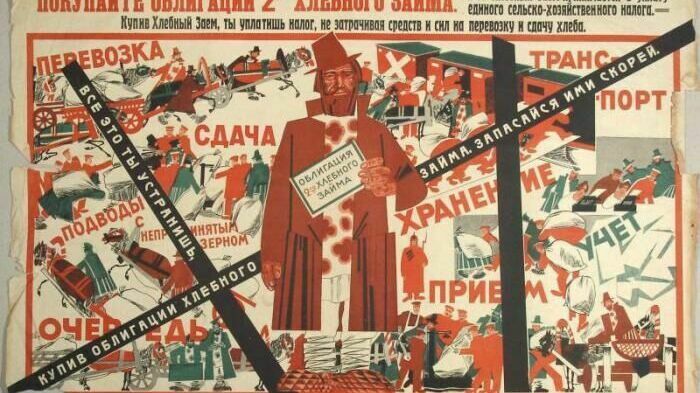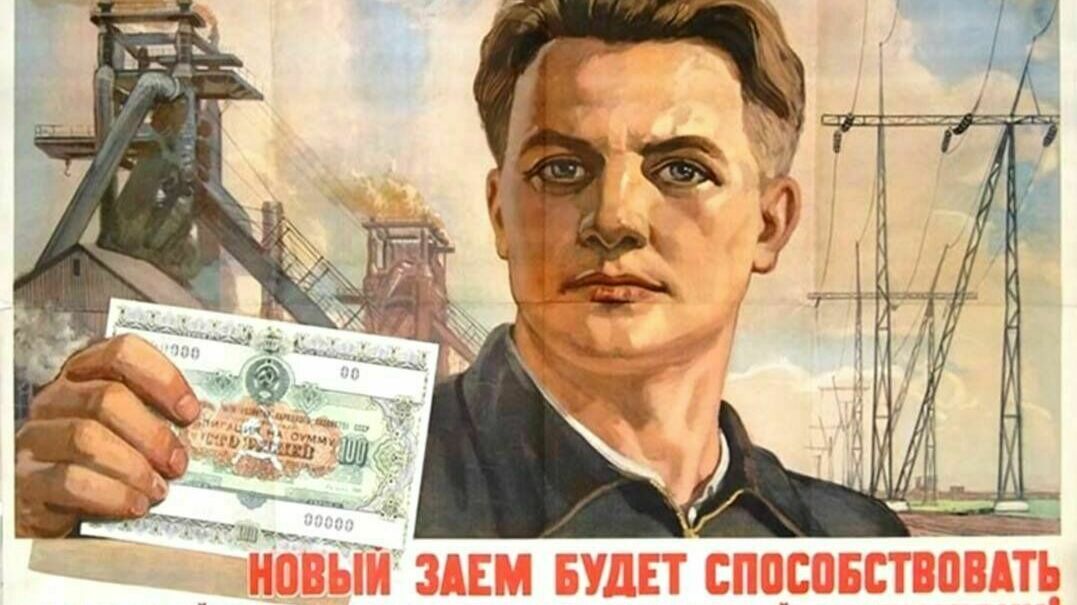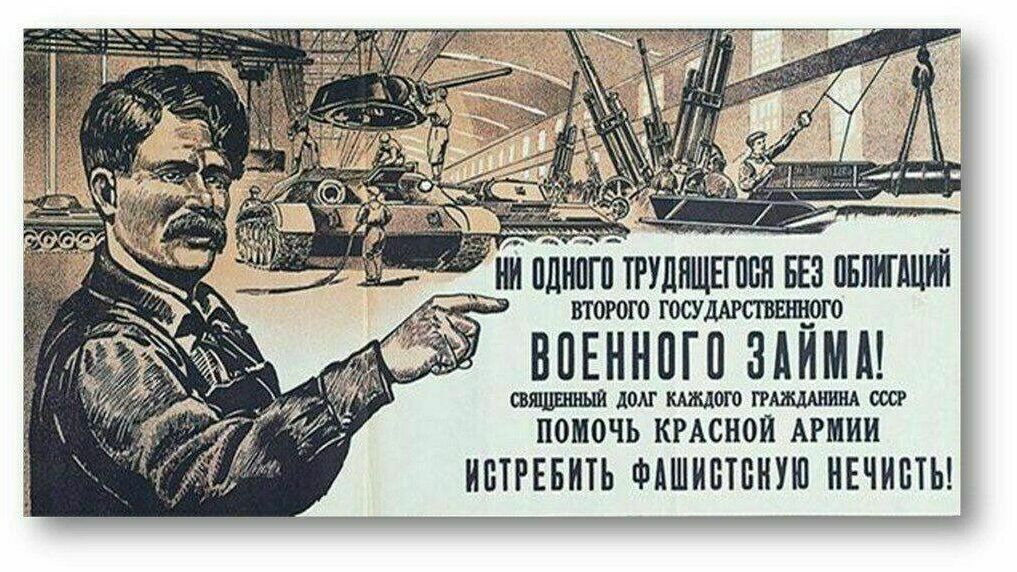Posted 17 марта 2023, 12:36
Published 17 марта 2023, 12:36
Modified 20 марта 2023, 10:35
Updated 20 марта 2023, 10:35
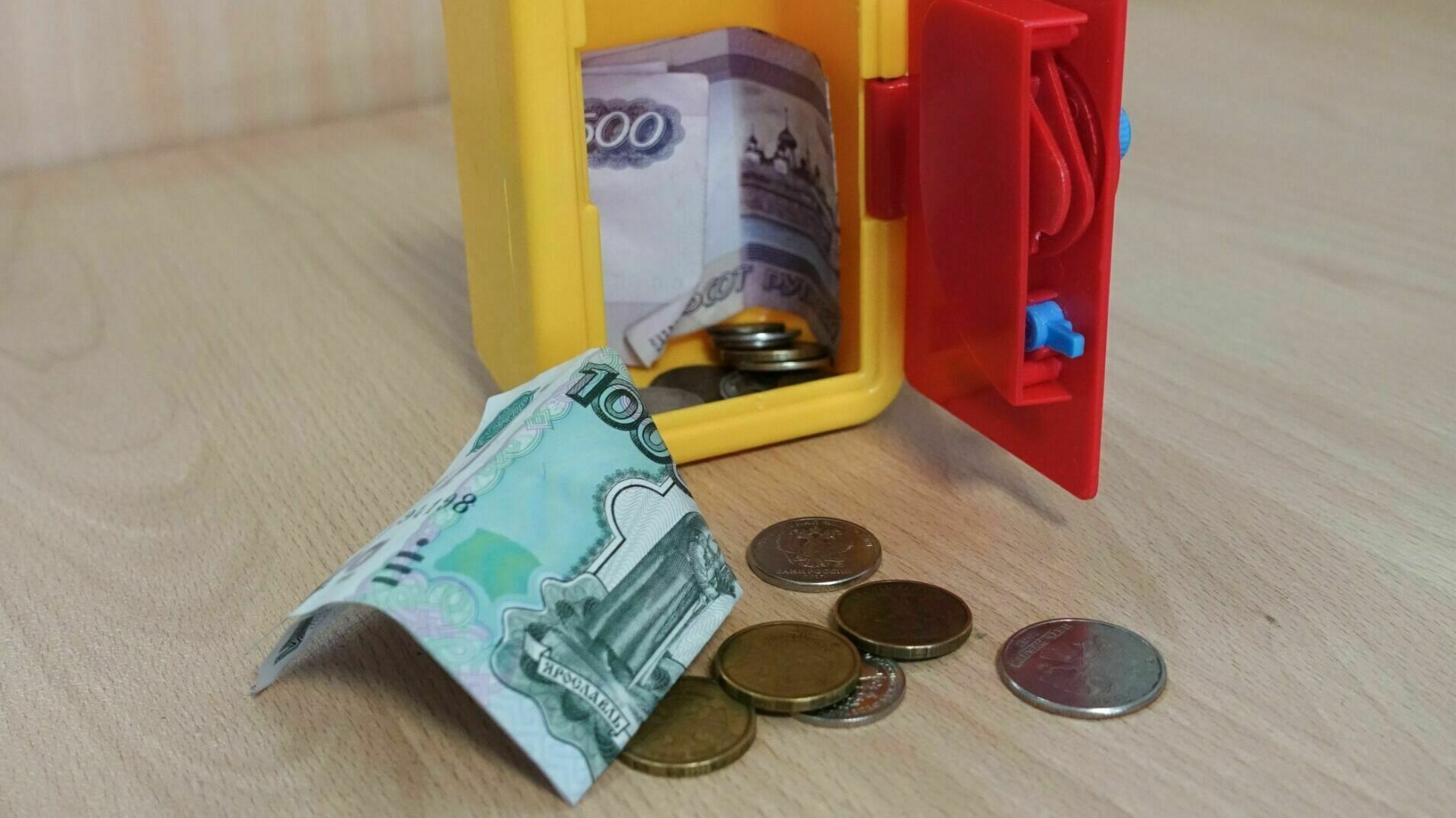
Share with the Ministry of Finance: how Russians will pay for the budget deficit
The state will close the hole in the budget by withdrawing funds from the people.
Victoria Pavlova
Anton Siluanov is having difficult times right now: in January and February 2023, oil and gas revenues amounted to only 947 billion rubles, which is 46% less than it was received in the same period last year. Other income decreased by 9% and amounted to 2.217 trillion rubles. And how can we talk about the beneficial effect of sanctions here?
At the same time, federal budget expenditures for the same period increased by 52% to 5.744 trillion rubles. The result of the beginning of the year under sanctions affecting the oil and gas sector: the federal budget deficit amounted to 2.581 trillion rubles. A colossal amount. For the whole of 2023, only 1.47 trillion rubles will be allocated from the federal budget for healthcare, for example. And this is just the beginning of the problems: the budget law states that by the end of 2023 the deficit should amount to 2.925 trillion rubles. But the maximum bar is almost reached. If we continue at this pace, we will come to the fact that by the end of the year the deficit will amount to 15.5 trillion rubles – almost 60% of federal budget revenues.
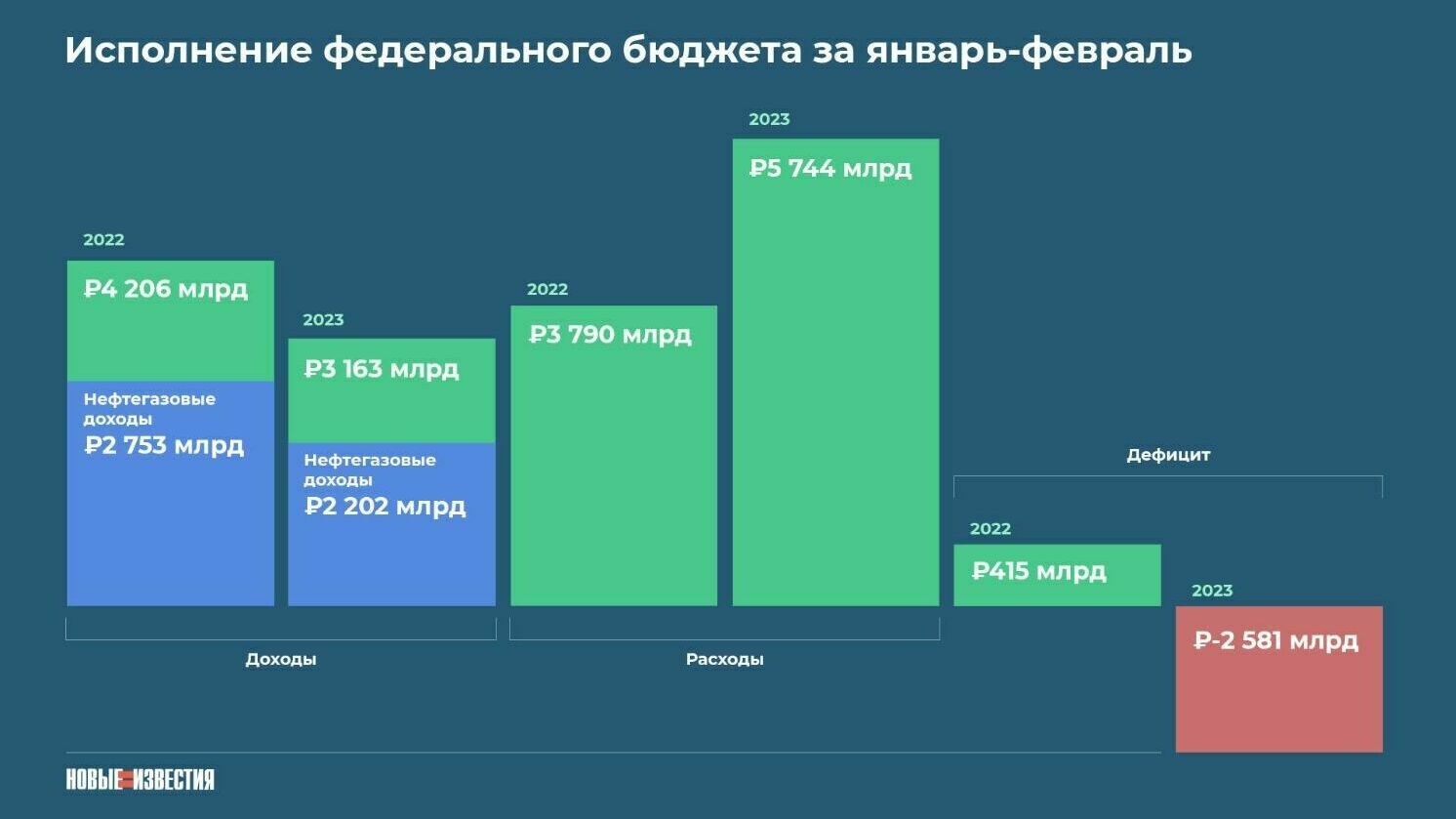

The deficit is not only the figures in the documents of the Ministry of Finance, but also real money, financing of the social sphere, industry. Deputy Minister Irina Okladnikova sees no problems: expenses in January were atypically high due to early advance payment of projects and early refund of export VAT, and revenues in the future will have to increase due to the expected rise in oil prices. Only half of March has already passed, and the discount on Urals oil is still almost 40% to the price of Brent oil. There are also rumors that India is preparing to join the rule not to buy or transport Russian oil more than $ 60 per barrel. There are no guarantees yet that the deficit will stop growing in the future. Siluanov does not like to borrow money: only recently Russia paid off Soviet debts. And it would be too naive to hope that someone on the international market will lend to our state in the face of sanctions. It remains only to look for funds within the country.
In debt to the people
A few days ago there was news that the Ministry of Finance may propose the issue of "patriotic bonds" for the population, which would be distributed through banks and other financial platforms. The idea is not new, there are examples of successful loans from the population in the world. Even the USA resorted to them. After America entered World War II in 1941, there was an urgent need for additional funding. Then it was decided to issue "war bonds". They were very simple: they had no coupon income (that is, people did not receive annual interest) and were sold for 75% of the nominal value. That is, a 10-year bond worth $25 could be bought for $18.75. As a result, 85 million Americans bought the papers, and the US authorities received more than $ 185 billion, despite the fact that the total costs of participating in the war amounted to about $ 300 billion. So the Lendliz technique was largely financed by ordinary Americans.
In 1927, they switched to a new scheme – the distribution of papers by subscription among labor collectives. This is also a form of forced loans. Workers of state–owned enterprises spent 6.5-7.6% of their salaries on repurchase of securities. And since 1938, collective farm workers have been obliged to buy government bonds. Otherwise, there was no way to borrow money: payments were postponed, interest was reduced. Forced loans during the Great Patriotic War provided about 10% of revenues to the state budget. But finally the reputation of government bonds among the people was spoiled in 1957, when the Central Committee of the CPSU and the Council of Ministers of the USSR decided to stop all payments and winnings on previously issued bonds.
However, the Ministry of Finance of the Russian Federation has a more recent experience of loans from the population: since 2017, within 5 years, people could purchase "people's bonds" OFZ-n. Alas, this program did not bring significant amounts to the budget. They have not become popular – explains the head of the Faculty of Economics and Business of the Financial University, PhD, Associate Professor Yekaterina Bezsmertnaya:
- For example, as of 01.01.2020, the volume of OFZ-n in circulation was 64.22 billion rubles, which corresponded to 0.69% of the total amount of the internal debt of the Russian Federation expressed in securities. For comparison: on the same date, the volumes of issued OFZ-PC (federal loan bonds with variable coupon) and OFZ-PD (federal loan bonds with constant income) amounted to 1713.85 and 6474.75 billion rubles, respectively. As of 01.01.2023, the volume of OFZ-n in circulation is only 0.12% of the total amount of the internal debt of the Russian Federation (22.15 billion rubles).
OFZ-n turned out to be far from the most attractive for the Ministry of Finance from the point of view of an ordinary person – adds Associate Professor of the Department of Management of RANEPA St. Petersburg, PhD David Tereladze:
- OFZs have not become popular, because the yield on OFS is very small. In a stable, growing market, it is much more profitable to buy corporate stocks and bonds. The yield on them is three to four times greater than the yield on government securities. OFZ is a safe tool for very conservative investors who want to save their money.
As Yekaterina Bezsmertnaya notes, there were a lot of difficulties with the sale of papers. To sell OFZ-n (everything happens in people's lives, sometimes money is urgently needed) and fix your profit is a non–trivial task:
- OFZ-n has a number of disadvantages. For example, these bonds are not traded on the secondary market: they can be purchased only through authorized agent banks (Sberbank, VTB, Promsvyazbank or Post Bank), and sold only by way of repurchase by an agent. At the same time, it is possible to sell bonds before maturity for the purchase price, but not above par. In addition, the purchase of bonds on an IC (individual investment account) is not allowed – thus, by purchasing OFZ-n, it is impossible to get a tax deduction.
The marketing component also let me down. According to Yekaterina Bezsmertnaya, the Ministry of Finance did not think through which audience the papers were designed for:
- For older people, with all the simplicity of the new tool, OFZ-n* (here and later in the text - federal loan bonds for the public, - editor's note), existing in electronic form, are not quite familiar and understandable: in their view, the bond should have a paper form. For "advanced" investors who have already had experience in stock trading, OFZ-n are too simple and do not allow them to operate as a tool for daily trading.
It would be too optimistic to issue new "patriotic bonds" against such a background and count on a significant amount of funds raised, although, as noted by Ruslan Spinka, Director of Sales and Customer Service at Fontvielle IC, the funds of the population in theory would be enough to solve many problems:
- Despite the outflow of funds from foreign currency accounts, Russians keep significant assets on ruble accounts. According to the latest review of the Central Bank of the banking sector, the annual growth of household funds exceeded the pace of 2021, and the total amount of balances amounted to 36.6 trillion rubles (+6.9% year-on-year). That is, these are the funds of individuals – Russians, which in the future can be redirected to debt securities.
As a result, the Ministry of Finance did not take any risks – it never came to discussing the details of the "patriotic bonds". Including, according to Yekaterina Bezsmertnaya, because of the long memory of people:
- The issue of "patriotic" bonds might be of interest to certain categories of citizens today who are ready to invest their funds for the sake of a certain idea. On the other hand, such issues are fraught with creating the ground for a kind of ideological speculation: there will always be those who want to draw parallels between a modern and, perhaps, useful initiative and forced subscriptions to government bonds known from the stories of older people.
Borrow cannot be withdrawn
If you borrowed money, then you need to return it. Unless there is a default, as in 1957 and 1998. But this is not the best option for the economy and investment attractiveness of the country. It's quite another thing to simply withdraw money. If you don't promise to return them, then there are no complaints. In addition, Russians are already used to raising taxes and fees. The Ministry of Finance recently came up with two proposals at once, which, in fact, simply imply the withdrawal of money.
The first is the suspension of agreements with "unfriendly" countries on the avoidance of double taxation. Now relocants who have lived abroad for more than 180 days a year lose their tax residency in the Russian Federation, and get the right not to pay property taxes and personal income tax in Russia. They are paid in the host country. Such agreements are in force with 84 countries, including the United States and the European Union. After the suspension of the agreements, our tax authorities will also take on emigrants with temporary relocators who have not yet completely severed ties with Russia and have not got rid of their property.
The second proposal is "voluntary" one–time business contributions to the budget. They were voluntary back in January 2023, when Anton Siluanov described in general terms the possibility of business to help the state. But now the main parameters of payers have been announced, and contributions no longer look so voluntary. The Ministry of Finance has exempted oil and gas and coal companies, as well as the entire sector of small and medium-sized businesses, from voluntary payments. Voluntary contributions will have to be made by companies with a profit of more than 1 billion rubles. But there is a nuance: pre-tax profit is taken into account here. What remains after taxes is no one cares anymore.
The exact amount of the contribution rate will be announced in April, but presumably it will amount to 5% of the amount of excess profit for 2021-2022 over the indicators of 2018-2019. But there is an estimate of the amount of "voluntary" fees: 300 billion rubles. Now it remains only to find out what punishment awaits for refusing to transfer voluntary contributions. And any withdrawals from business are withdrawals from the population in the form of increased prices for goods. Just out of pure altruism, the business will not suffer losses.
Hope for the printing press
But what is 300 billion rubles when the budget deficit is measured in trillions? A drop in the ocean. You won't be satisfied with this measure alone. The tax authorities began to shake even bloggers (fitness blogger Lerchek and her husband had already been taxed for 300 million rubles), then they opened another case - about money laundering, closed the opportunity to use the Internet and took a subscription not to leave. Rumor has it that the tax authorities are planning to arrange a "check" all over the cozy multibillion-dollar blogging world, but many of them turned out to be faster than the "lercheks" and have already settled somewhere in Dubai. Therefore, David Tereladze is sure that it will not do without the launch of the "printing press" – also nothing good for ordinary people:
- No matter how banal it may sound, that in the future we will have a printing press turned on. And this will lead to an increase in inflation. But of course, bond loans will be very well used. But we all remember the crisis of 1998, when the main mechanism for covering the budget deficit was bonds, which led to the formation of a bubble and actually a crisis. Therefore, there is a danger of a repeat of the 1998 crisis. I can say that we have few options, and the country is isolated. Many classic tools to cover the deficit are not available to us.
Anton Siluanov found himself between two fires: it is impossible to increase the deficit indefinitely, and it is also dangerous to print money, borrow from businesses in the desired volumes. We will not be surprised if the government still returns to the idea of loans from the population. It is possible that forced. The experience of the USSR is known, there are more than 60 million state employees in Russia – there are all the necessary conditions to roam in a big way.
I am familiar with the experience of distributing people's bonds in the USSR. Only the approach was different. The first papers were issued in 1922 during the transition to the NEP: the external debt market, as it is now for Russia, was then closed – it was necessary to find internal resources. The first issue of government bonds was denominated not in rubles, but in poods of grain. The campaign went well – the revenue from sales amounted to 25% of the average mass of paper money. But already in 1923, demand fell and forced loans had to be issued, which private entrepreneurs, commission agents, contractors and other "NEPs" were obliged to buy.
